HI6025 Accounting Theories: Agency Theory and Family Business
VerifiedAdded on 2023/06/15
|15
|3589
|88
Report
AI Summary
This report analyzes agency theory in relation to family firm performance and governance, drawing from a peer-reviewed journal article. It examines the traditional view of agency theory and its applicability to family firms, considering factors like family involvement and non-economic goals. The report discusses the potential for agency problems within family firms, such as misalignment of shareholder goals and asymmetric altruism, and how these can impact performance. It further explores the governance mechanisms prescribed by agency theory, including monitoring activities, boards of directors, and incentive compensation plans, and how they can be adapted to the unique context of family businesses. The analysis contrasts agency theory with stewardship theory, highlighting the importance of governance in fostering stewardship behavior and curbing agent behavior. Ultimately, the report concludes that agency theory provides valuable insights for enhancing the performance of family firms and promoting pro-organizational behavior, while acknowledging the limitations of existing research and the need for further exploration of family-specific factors in shaping agency dynamics. Desklib provides similar solved assignments and past papers for students.
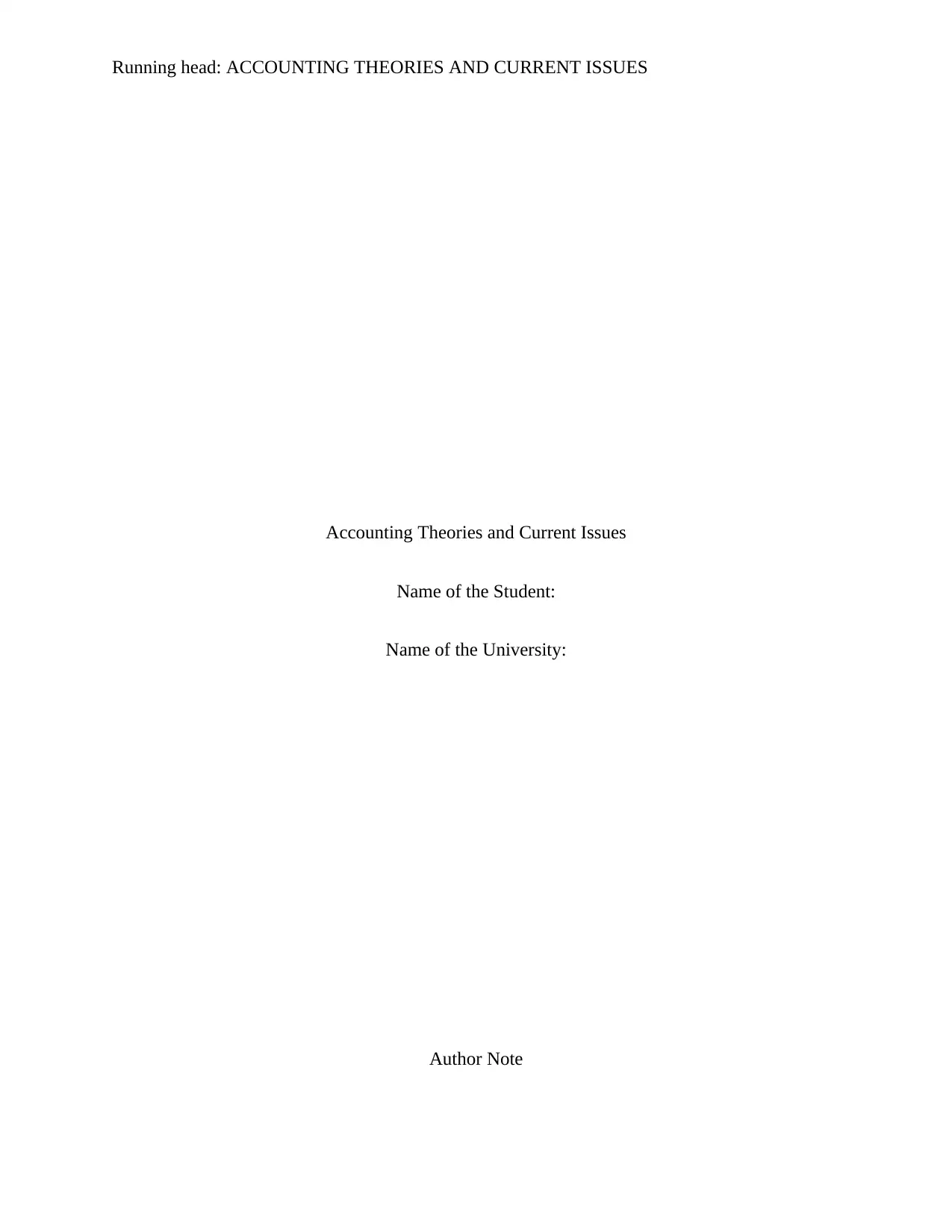
Running head: ACCOUNTING THEORIES AND CURRENT ISSUES
Accounting Theories and Current Issues
Name of the Student:
Name of the University:
Author Note
Accounting Theories and Current Issues
Name of the Student:
Name of the University:
Author Note
Paraphrase This Document
Need a fresh take? Get an instant paraphrase of this document with our AI Paraphraser

1
ACCOUNTING THEORIES AND CURRENT ISSUES
ACCOUNTING THEORIES AND CURRENT ISSUES
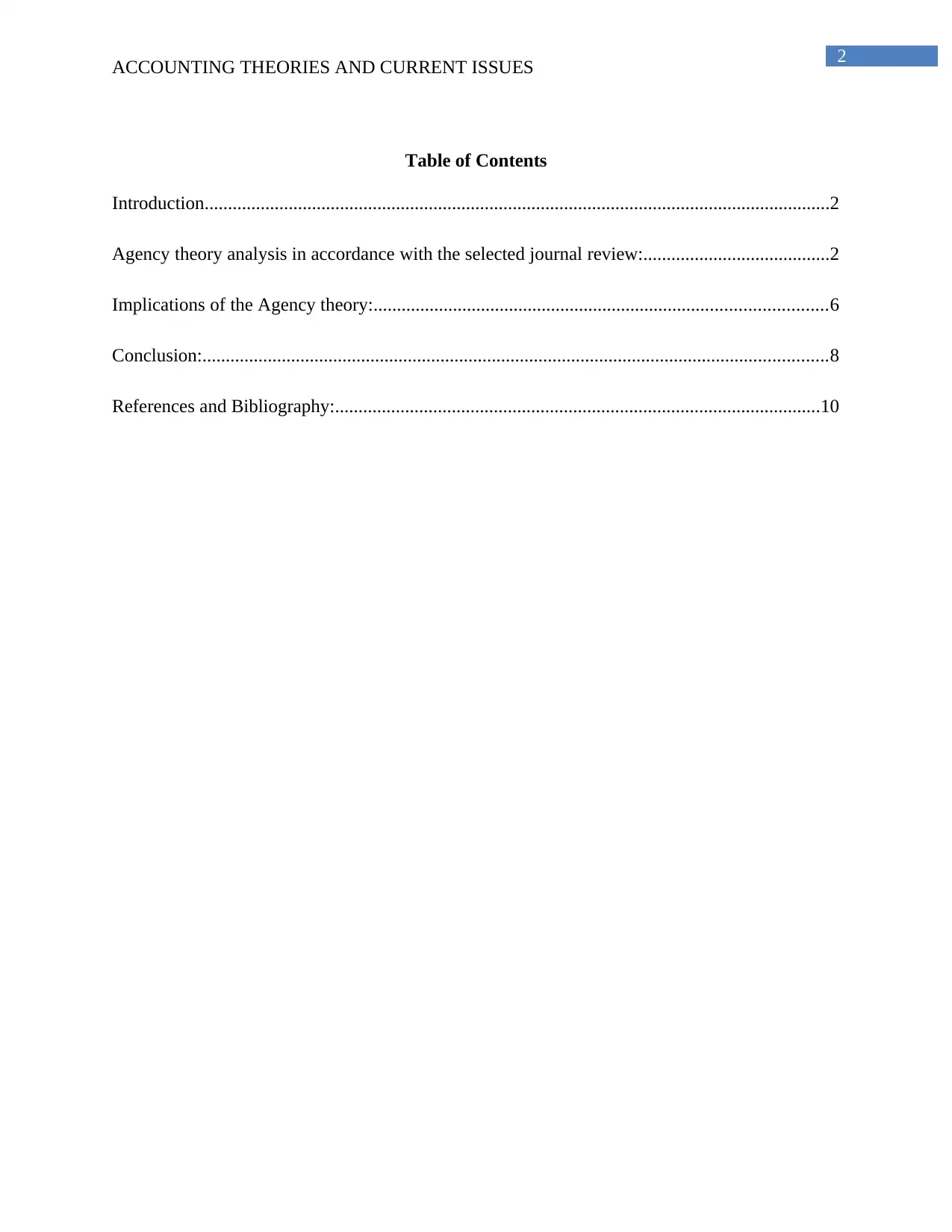
2
ACCOUNTING THEORIES AND CURRENT ISSUES
Table of Contents
Introduction......................................................................................................................................2
Agency theory analysis in accordance with the selected journal review:........................................2
Implications of the Agency theory:.................................................................................................6
Conclusion:......................................................................................................................................8
References and Bibliography:........................................................................................................10
ACCOUNTING THEORIES AND CURRENT ISSUES
Table of Contents
Introduction......................................................................................................................................2
Agency theory analysis in accordance with the selected journal review:........................................2
Implications of the Agency theory:.................................................................................................6
Conclusion:......................................................................................................................................8
References and Bibliography:........................................................................................................10
⊘ This is a preview!⊘
Do you want full access?
Subscribe today to unlock all pages.

Trusted by 1+ million students worldwide
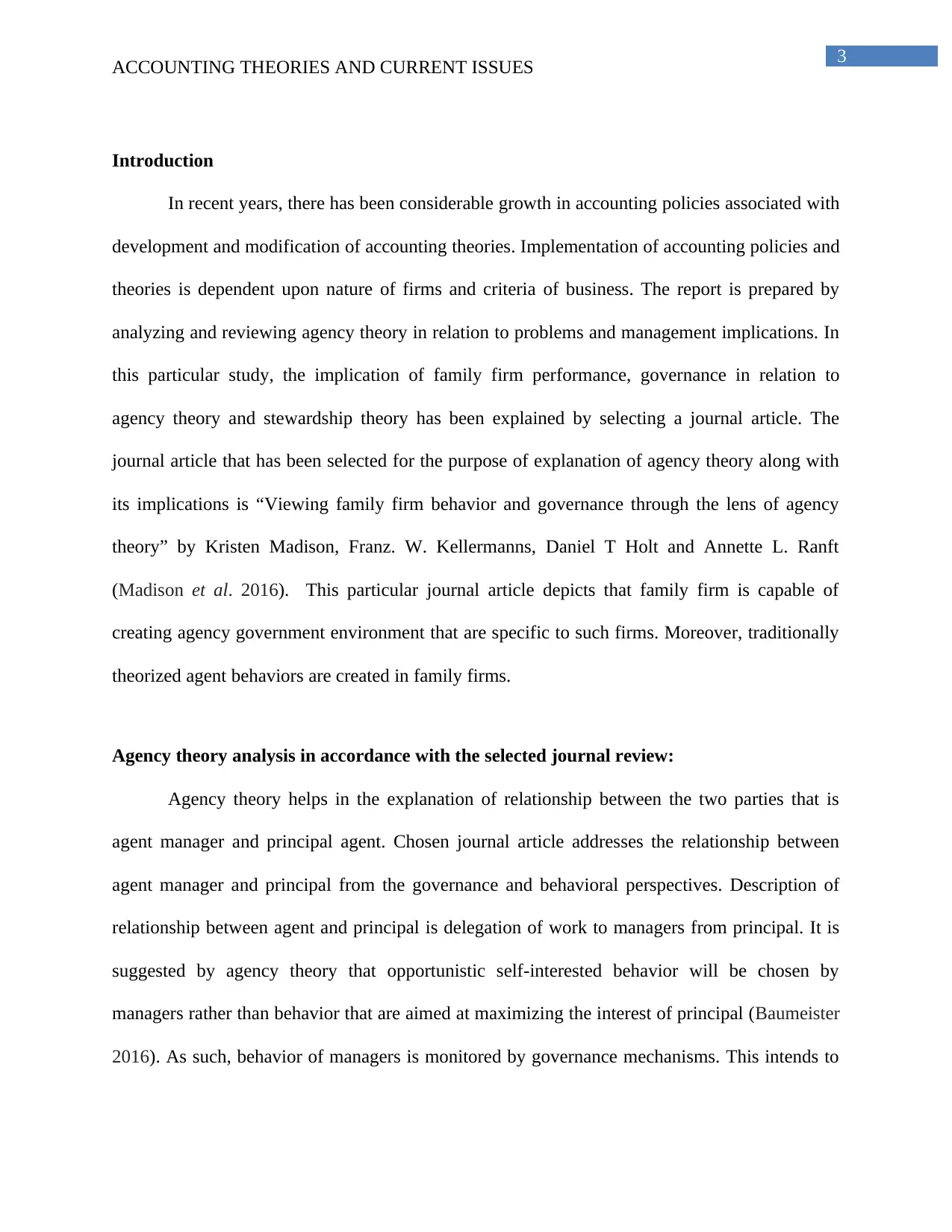
3
ACCOUNTING THEORIES AND CURRENT ISSUES
Introduction
In recent years, there has been considerable growth in accounting policies associated with
development and modification of accounting theories. Implementation of accounting policies and
theories is dependent upon nature of firms and criteria of business. The report is prepared by
analyzing and reviewing agency theory in relation to problems and management implications. In
this particular study, the implication of family firm performance, governance in relation to
agency theory and stewardship theory has been explained by selecting a journal article. The
journal article that has been selected for the purpose of explanation of agency theory along with
its implications is “Viewing family firm behavior and governance through the lens of agency
theory” by Kristen Madison, Franz. W. Kellermanns, Daniel T Holt and Annette L. Ranft
(Madison et al. 2016). This particular journal article depicts that family firm is capable of
creating agency government environment that are specific to such firms. Moreover, traditionally
theorized agent behaviors are created in family firms.
Agency theory analysis in accordance with the selected journal review:
Agency theory helps in the explanation of relationship between the two parties that is
agent manager and principal agent. Chosen journal article addresses the relationship between
agent manager and principal from the governance and behavioral perspectives. Description of
relationship between agent and principal is delegation of work to managers from principal. It is
suggested by agency theory that opportunistic self-interested behavior will be chosen by
managers rather than behavior that are aimed at maximizing the interest of principal (Baumeister
2016). As such, behavior of managers is monitored by governance mechanisms. This intends to
ACCOUNTING THEORIES AND CURRENT ISSUES
Introduction
In recent years, there has been considerable growth in accounting policies associated with
development and modification of accounting theories. Implementation of accounting policies and
theories is dependent upon nature of firms and criteria of business. The report is prepared by
analyzing and reviewing agency theory in relation to problems and management implications. In
this particular study, the implication of family firm performance, governance in relation to
agency theory and stewardship theory has been explained by selecting a journal article. The
journal article that has been selected for the purpose of explanation of agency theory along with
its implications is “Viewing family firm behavior and governance through the lens of agency
theory” by Kristen Madison, Franz. W. Kellermanns, Daniel T Holt and Annette L. Ranft
(Madison et al. 2016). This particular journal article depicts that family firm is capable of
creating agency government environment that are specific to such firms. Moreover, traditionally
theorized agent behaviors are created in family firms.
Agency theory analysis in accordance with the selected journal review:
Agency theory helps in the explanation of relationship between the two parties that is
agent manager and principal agent. Chosen journal article addresses the relationship between
agent manager and principal from the governance and behavioral perspectives. Description of
relationship between agent and principal is delegation of work to managers from principal. It is
suggested by agency theory that opportunistic self-interested behavior will be chosen by
managers rather than behavior that are aimed at maximizing the interest of principal (Baumeister
2016). As such, behavior of managers is monitored by governance mechanisms. This intends to
Paraphrase This Document
Need a fresh take? Get an instant paraphrase of this document with our AI Paraphraser
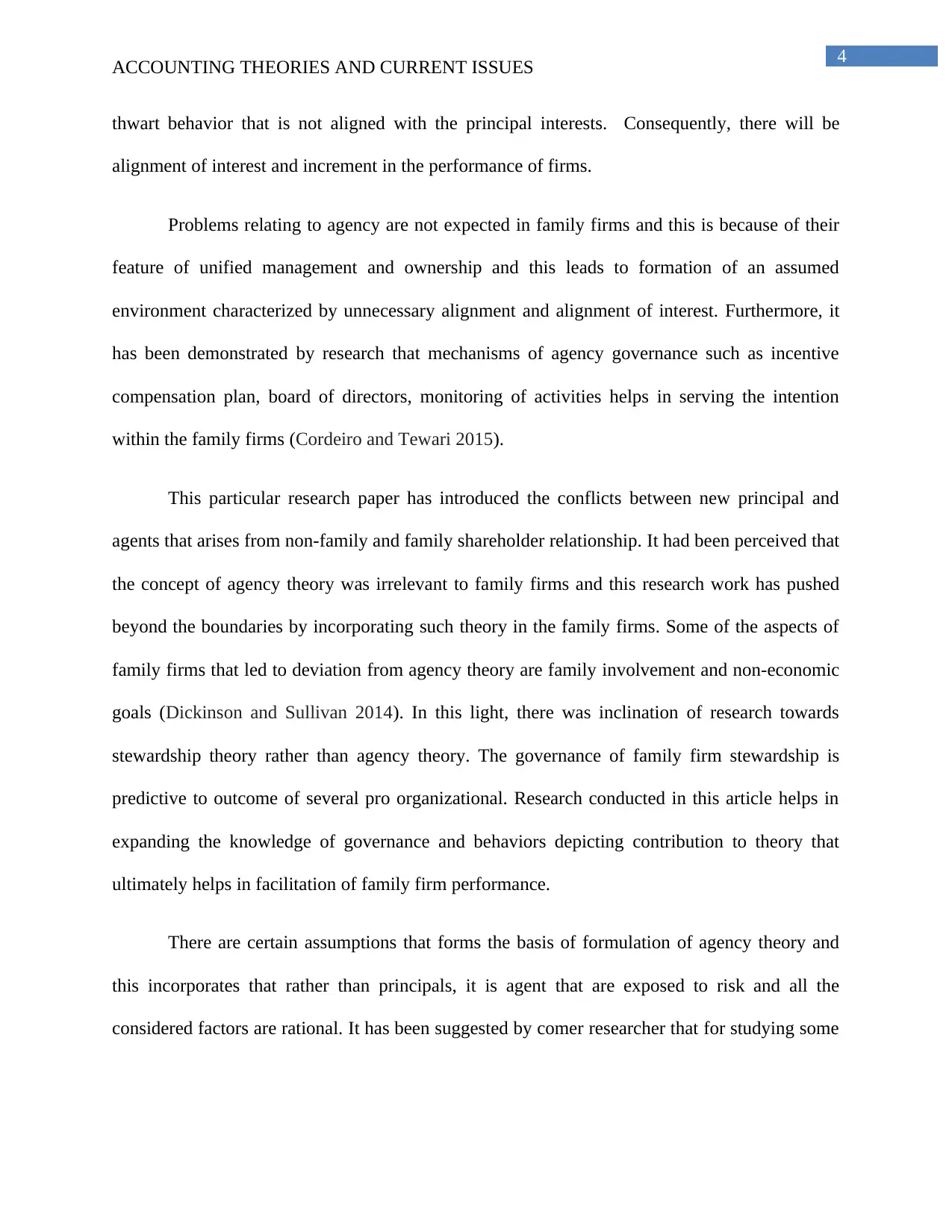
4
ACCOUNTING THEORIES AND CURRENT ISSUES
thwart behavior that is not aligned with the principal interests. Consequently, there will be
alignment of interest and increment in the performance of firms.
Problems relating to agency are not expected in family firms and this is because of their
feature of unified management and ownership and this leads to formation of an assumed
environment characterized by unnecessary alignment and alignment of interest. Furthermore, it
has been demonstrated by research that mechanisms of agency governance such as incentive
compensation plan, board of directors, monitoring of activities helps in serving the intention
within the family firms (Cordeiro and Tewari 2015).
This particular research paper has introduced the conflicts between new principal and
agents that arises from non-family and family shareholder relationship. It had been perceived that
the concept of agency theory was irrelevant to family firms and this research work has pushed
beyond the boundaries by incorporating such theory in the family firms. Some of the aspects of
family firms that led to deviation from agency theory are family involvement and non-economic
goals (Dickinson and Sullivan 2014). In this light, there was inclination of research towards
stewardship theory rather than agency theory. The governance of family firm stewardship is
predictive to outcome of several pro organizational. Research conducted in this article helps in
expanding the knowledge of governance and behaviors depicting contribution to theory that
ultimately helps in facilitation of family firm performance.
There are certain assumptions that forms the basis of formulation of agency theory and
this incorporates that rather than principals, it is agent that are exposed to risk and all the
considered factors are rational. It has been suggested by comer researcher that for studying some
ACCOUNTING THEORIES AND CURRENT ISSUES
thwart behavior that is not aligned with the principal interests. Consequently, there will be
alignment of interest and increment in the performance of firms.
Problems relating to agency are not expected in family firms and this is because of their
feature of unified management and ownership and this leads to formation of an assumed
environment characterized by unnecessary alignment and alignment of interest. Furthermore, it
has been demonstrated by research that mechanisms of agency governance such as incentive
compensation plan, board of directors, monitoring of activities helps in serving the intention
within the family firms (Cordeiro and Tewari 2015).
This particular research paper has introduced the conflicts between new principal and
agents that arises from non-family and family shareholder relationship. It had been perceived that
the concept of agency theory was irrelevant to family firms and this research work has pushed
beyond the boundaries by incorporating such theory in the family firms. Some of the aspects of
family firms that led to deviation from agency theory are family involvement and non-economic
goals (Dickinson and Sullivan 2014). In this light, there was inclination of research towards
stewardship theory rather than agency theory. The governance of family firm stewardship is
predictive to outcome of several pro organizational. Research conducted in this article helps in
expanding the knowledge of governance and behaviors depicting contribution to theory that
ultimately helps in facilitation of family firm performance.
There are certain assumptions that forms the basis of formulation of agency theory and
this incorporates that rather than principals, it is agent that are exposed to risk and all the
considered factors are rational. It has been suggested by comer researcher that for studying some
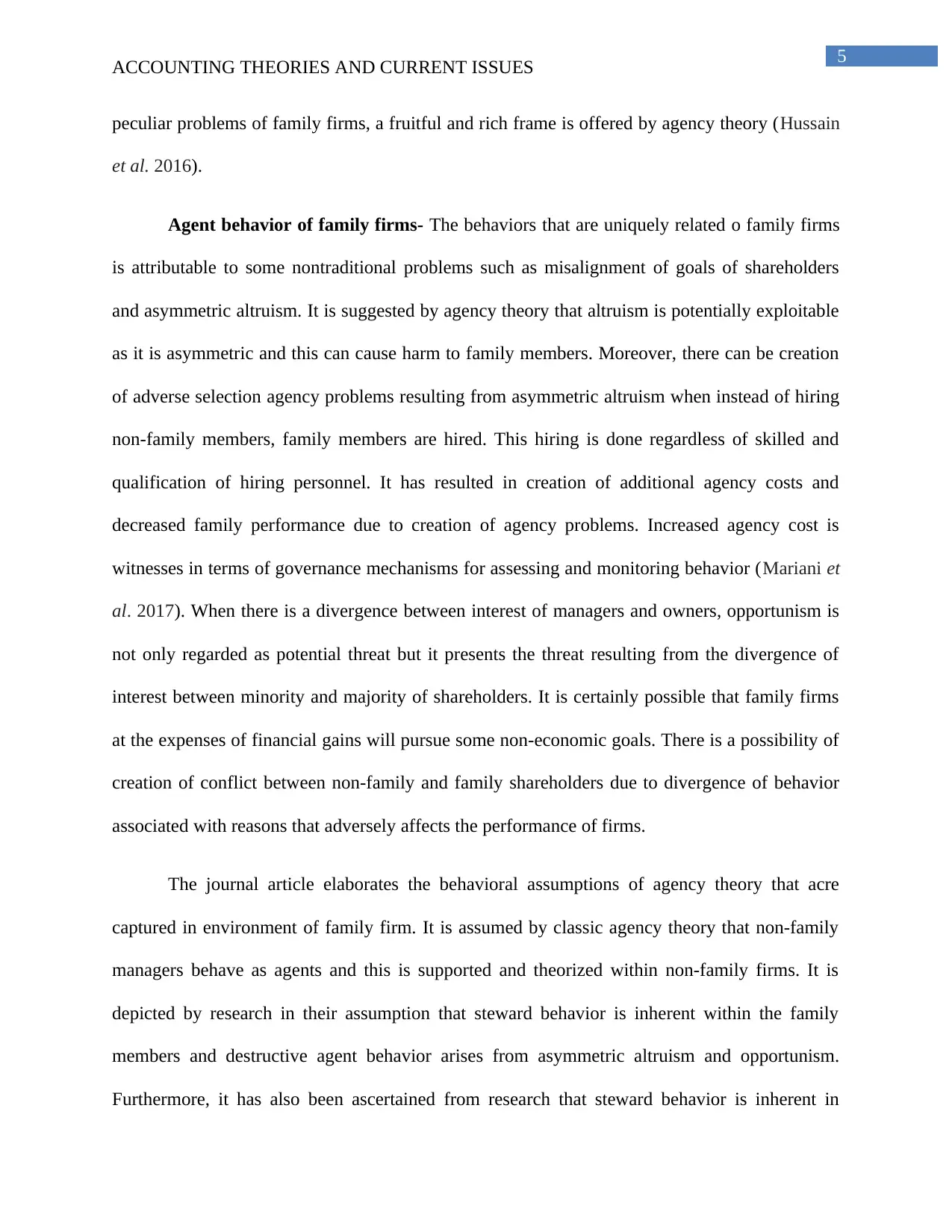
5
ACCOUNTING THEORIES AND CURRENT ISSUES
peculiar problems of family firms, a fruitful and rich frame is offered by agency theory (Hussain
et al. 2016).
Agent behavior of family firms- The behaviors that are uniquely related o family firms
is attributable to some nontraditional problems such as misalignment of goals of shareholders
and asymmetric altruism. It is suggested by agency theory that altruism is potentially exploitable
as it is asymmetric and this can cause harm to family members. Moreover, there can be creation
of adverse selection agency problems resulting from asymmetric altruism when instead of hiring
non-family members, family members are hired. This hiring is done regardless of skilled and
qualification of hiring personnel. It has resulted in creation of additional agency costs and
decreased family performance due to creation of agency problems. Increased agency cost is
witnesses in terms of governance mechanisms for assessing and monitoring behavior (Mariani et
al. 2017). When there is a divergence between interest of managers and owners, opportunism is
not only regarded as potential threat but it presents the threat resulting from the divergence of
interest between minority and majority of shareholders. It is certainly possible that family firms
at the expenses of financial gains will pursue some non-economic goals. There is a possibility of
creation of conflict between non-family and family shareholders due to divergence of behavior
associated with reasons that adversely affects the performance of firms.
The journal article elaborates the behavioral assumptions of agency theory that acre
captured in environment of family firm. It is assumed by classic agency theory that non-family
managers behave as agents and this is supported and theorized within non-family firms. It is
depicted by research in their assumption that steward behavior is inherent within the family
members and destructive agent behavior arises from asymmetric altruism and opportunism.
Furthermore, it has also been ascertained from research that steward behavior is inherent in
ACCOUNTING THEORIES AND CURRENT ISSUES
peculiar problems of family firms, a fruitful and rich frame is offered by agency theory (Hussain
et al. 2016).
Agent behavior of family firms- The behaviors that are uniquely related o family firms
is attributable to some nontraditional problems such as misalignment of goals of shareholders
and asymmetric altruism. It is suggested by agency theory that altruism is potentially exploitable
as it is asymmetric and this can cause harm to family members. Moreover, there can be creation
of adverse selection agency problems resulting from asymmetric altruism when instead of hiring
non-family members, family members are hired. This hiring is done regardless of skilled and
qualification of hiring personnel. It has resulted in creation of additional agency costs and
decreased family performance due to creation of agency problems. Increased agency cost is
witnesses in terms of governance mechanisms for assessing and monitoring behavior (Mariani et
al. 2017). When there is a divergence between interest of managers and owners, opportunism is
not only regarded as potential threat but it presents the threat resulting from the divergence of
interest between minority and majority of shareholders. It is certainly possible that family firms
at the expenses of financial gains will pursue some non-economic goals. There is a possibility of
creation of conflict between non-family and family shareholders due to divergence of behavior
associated with reasons that adversely affects the performance of firms.
The journal article elaborates the behavioral assumptions of agency theory that acre
captured in environment of family firm. It is assumed by classic agency theory that non-family
managers behave as agents and this is supported and theorized within non-family firms. It is
depicted by research in their assumption that steward behavior is inherent within the family
members and destructive agent behavior arises from asymmetric altruism and opportunism.
Furthermore, it has also been ascertained from research that steward behavior is inherent in
⊘ This is a preview!⊘
Do you want full access?
Subscribe today to unlock all pages.

Trusted by 1+ million students worldwide
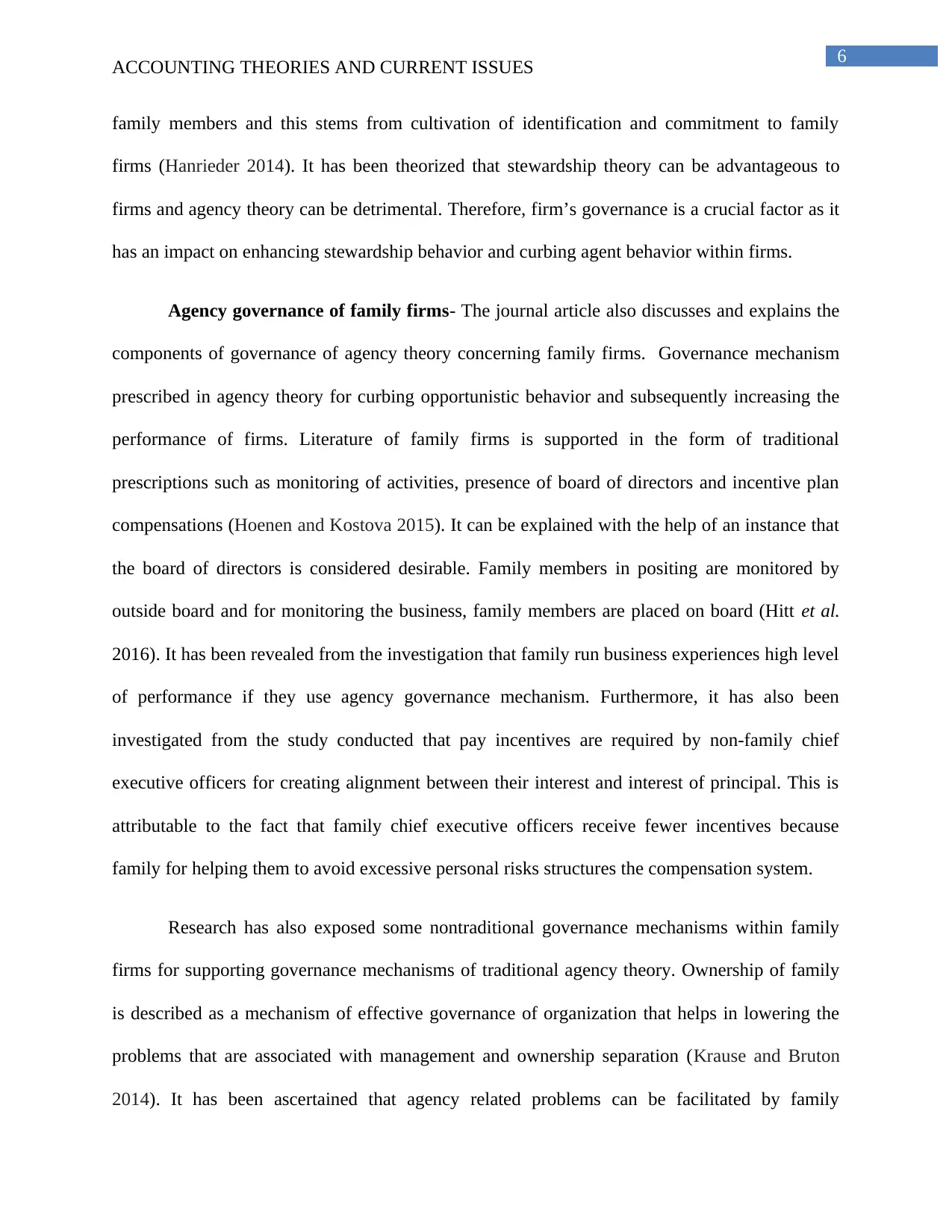
6
ACCOUNTING THEORIES AND CURRENT ISSUES
family members and this stems from cultivation of identification and commitment to family
firms (Hanrieder 2014). It has been theorized that stewardship theory can be advantageous to
firms and agency theory can be detrimental. Therefore, firm’s governance is a crucial factor as it
has an impact on enhancing stewardship behavior and curbing agent behavior within firms.
Agency governance of family firms- The journal article also discusses and explains the
components of governance of agency theory concerning family firms. Governance mechanism
prescribed in agency theory for curbing opportunistic behavior and subsequently increasing the
performance of firms. Literature of family firms is supported in the form of traditional
prescriptions such as monitoring of activities, presence of board of directors and incentive plan
compensations (Hoenen and Kostova 2015). It can be explained with the help of an instance that
the board of directors is considered desirable. Family members in positing are monitored by
outside board and for monitoring the business, family members are placed on board (Hitt et al.
2016). It has been revealed from the investigation that family run business experiences high level
of performance if they use agency governance mechanism. Furthermore, it has also been
investigated from the study conducted that pay incentives are required by non-family chief
executive officers for creating alignment between their interest and interest of principal. This is
attributable to the fact that family chief executive officers receive fewer incentives because
family for helping them to avoid excessive personal risks structures the compensation system.
Research has also exposed some nontraditional governance mechanisms within family
firms for supporting governance mechanisms of traditional agency theory. Ownership of family
is described as a mechanism of effective governance of organization that helps in lowering the
problems that are associated with management and ownership separation (Krause and Bruton
2014). It has been ascertained that agency related problems can be facilitated by family
ACCOUNTING THEORIES AND CURRENT ISSUES
family members and this stems from cultivation of identification and commitment to family
firms (Hanrieder 2014). It has been theorized that stewardship theory can be advantageous to
firms and agency theory can be detrimental. Therefore, firm’s governance is a crucial factor as it
has an impact on enhancing stewardship behavior and curbing agent behavior within firms.
Agency governance of family firms- The journal article also discusses and explains the
components of governance of agency theory concerning family firms. Governance mechanism
prescribed in agency theory for curbing opportunistic behavior and subsequently increasing the
performance of firms. Literature of family firms is supported in the form of traditional
prescriptions such as monitoring of activities, presence of board of directors and incentive plan
compensations (Hoenen and Kostova 2015). It can be explained with the help of an instance that
the board of directors is considered desirable. Family members in positing are monitored by
outside board and for monitoring the business, family members are placed on board (Hitt et al.
2016). It has been revealed from the investigation that family run business experiences high level
of performance if they use agency governance mechanism. Furthermore, it has also been
investigated from the study conducted that pay incentives are required by non-family chief
executive officers for creating alignment between their interest and interest of principal. This is
attributable to the fact that family chief executive officers receive fewer incentives because
family for helping them to avoid excessive personal risks structures the compensation system.
Research has also exposed some nontraditional governance mechanisms within family
firms for supporting governance mechanisms of traditional agency theory. Ownership of family
is described as a mechanism of effective governance of organization that helps in lowering the
problems that are associated with management and ownership separation (Krause and Bruton
2014). It has been ascertained that agency related problems can be facilitated by family
Paraphrase This Document
Need a fresh take? Get an instant paraphrase of this document with our AI Paraphraser
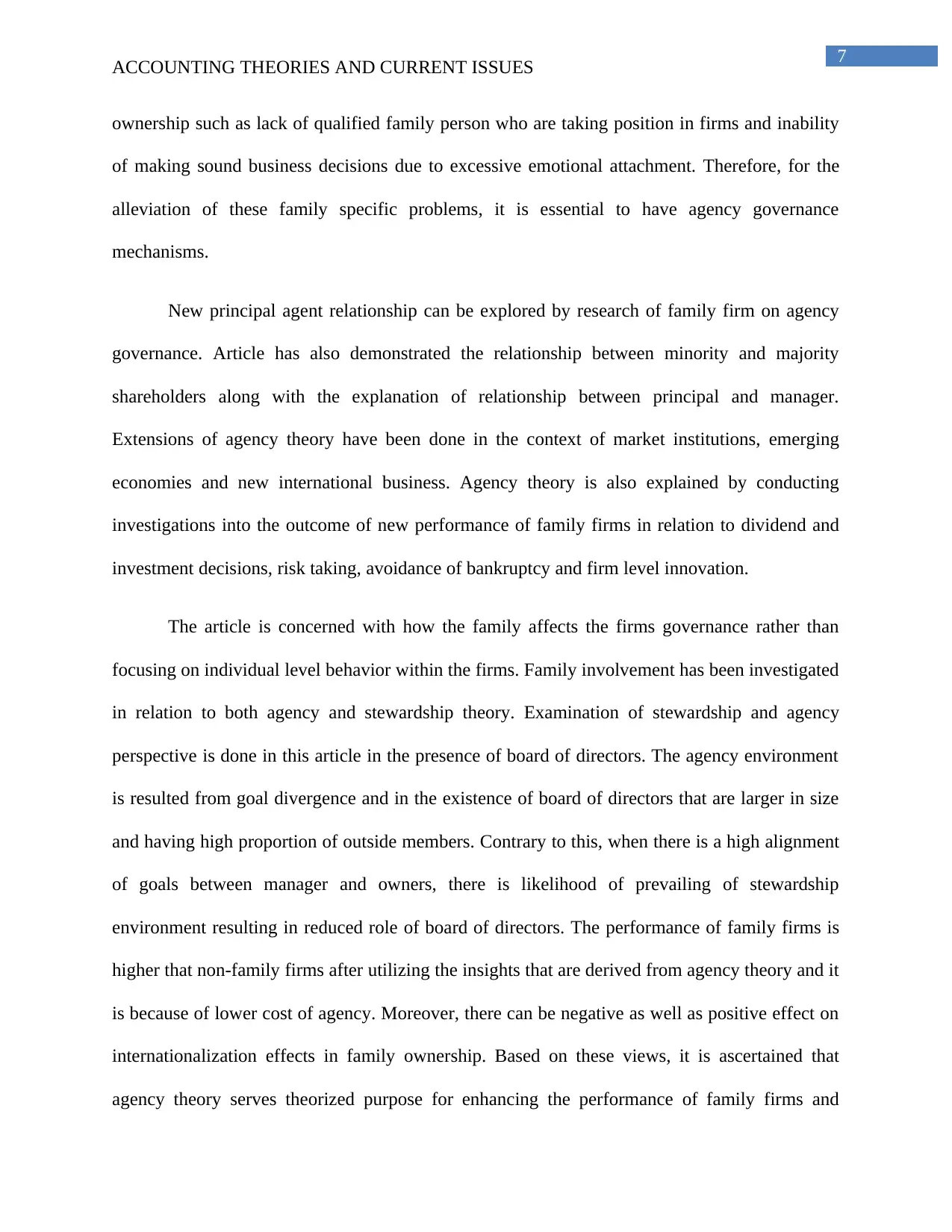
7
ACCOUNTING THEORIES AND CURRENT ISSUES
ownership such as lack of qualified family person who are taking position in firms and inability
of making sound business decisions due to excessive emotional attachment. Therefore, for the
alleviation of these family specific problems, it is essential to have agency governance
mechanisms.
New principal agent relationship can be explored by research of family firm on agency
governance. Article has also demonstrated the relationship between minority and majority
shareholders along with the explanation of relationship between principal and manager.
Extensions of agency theory have been done in the context of market institutions, emerging
economies and new international business. Agency theory is also explained by conducting
investigations into the outcome of new performance of family firms in relation to dividend and
investment decisions, risk taking, avoidance of bankruptcy and firm level innovation.
The article is concerned with how the family affects the firms governance rather than
focusing on individual level behavior within the firms. Family involvement has been investigated
in relation to both agency and stewardship theory. Examination of stewardship and agency
perspective is done in this article in the presence of board of directors. The agency environment
is resulted from goal divergence and in the existence of board of directors that are larger in size
and having high proportion of outside members. Contrary to this, when there is a high alignment
of goals between manager and owners, there is likelihood of prevailing of stewardship
environment resulting in reduced role of board of directors. The performance of family firms is
higher that non-family firms after utilizing the insights that are derived from agency theory and it
is because of lower cost of agency. Moreover, there can be negative as well as positive effect on
internationalization effects in family ownership. Based on these views, it is ascertained that
agency theory serves theorized purpose for enhancing the performance of family firms and
ACCOUNTING THEORIES AND CURRENT ISSUES
ownership such as lack of qualified family person who are taking position in firms and inability
of making sound business decisions due to excessive emotional attachment. Therefore, for the
alleviation of these family specific problems, it is essential to have agency governance
mechanisms.
New principal agent relationship can be explored by research of family firm on agency
governance. Article has also demonstrated the relationship between minority and majority
shareholders along with the explanation of relationship between principal and manager.
Extensions of agency theory have been done in the context of market institutions, emerging
economies and new international business. Agency theory is also explained by conducting
investigations into the outcome of new performance of family firms in relation to dividend and
investment decisions, risk taking, avoidance of bankruptcy and firm level innovation.
The article is concerned with how the family affects the firms governance rather than
focusing on individual level behavior within the firms. Family involvement has been investigated
in relation to both agency and stewardship theory. Examination of stewardship and agency
perspective is done in this article in the presence of board of directors. The agency environment
is resulted from goal divergence and in the existence of board of directors that are larger in size
and having high proportion of outside members. Contrary to this, when there is a high alignment
of goals between manager and owners, there is likelihood of prevailing of stewardship
environment resulting in reduced role of board of directors. The performance of family firms is
higher that non-family firms after utilizing the insights that are derived from agency theory and it
is because of lower cost of agency. Moreover, there can be negative as well as positive effect on
internationalization effects in family ownership. Based on these views, it is ascertained that
agency theory serves theorized purpose for enhancing the performance of family firms and
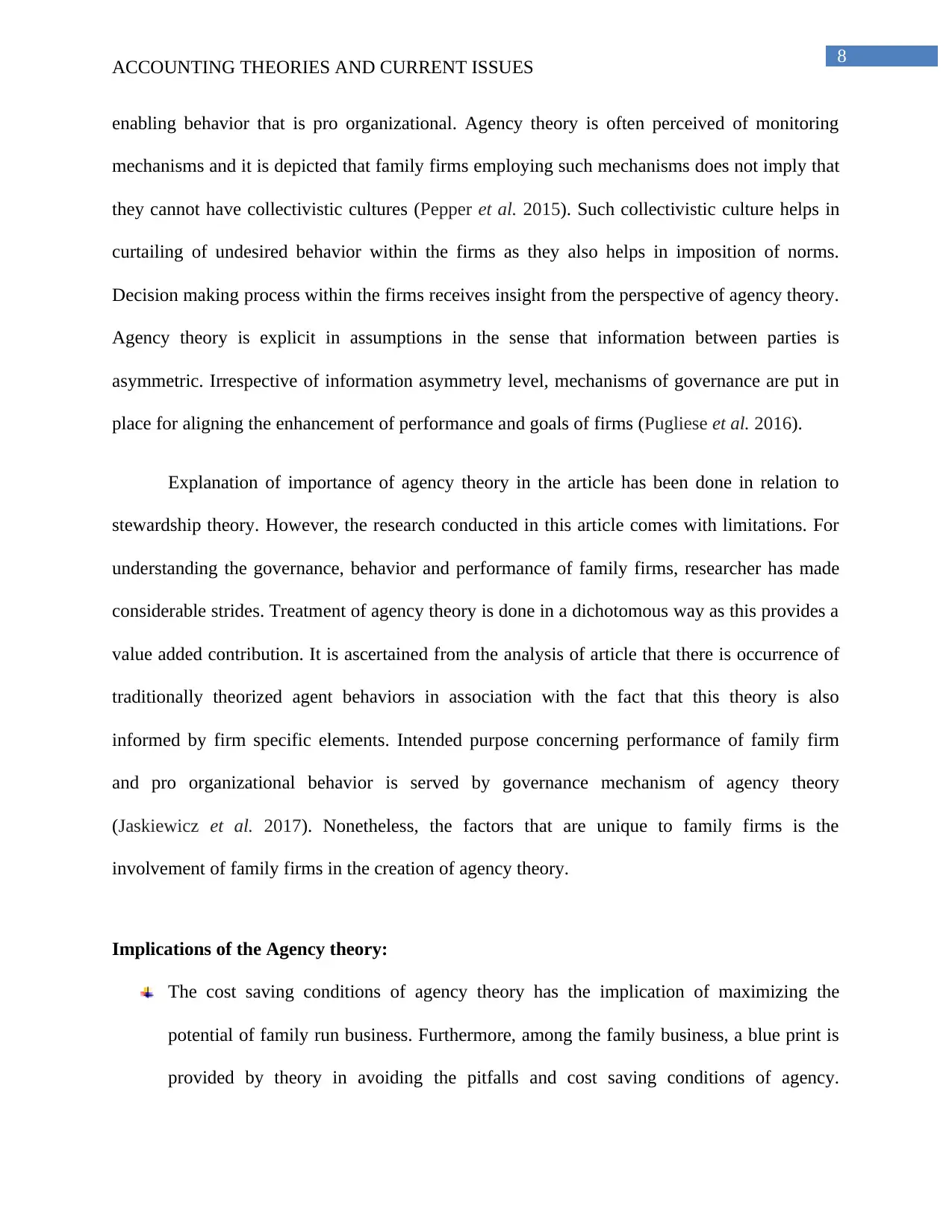
8
ACCOUNTING THEORIES AND CURRENT ISSUES
enabling behavior that is pro organizational. Agency theory is often perceived of monitoring
mechanisms and it is depicted that family firms employing such mechanisms does not imply that
they cannot have collectivistic cultures (Pepper et al. 2015). Such collectivistic culture helps in
curtailing of undesired behavior within the firms as they also helps in imposition of norms.
Decision making process within the firms receives insight from the perspective of agency theory.
Agency theory is explicit in assumptions in the sense that information between parties is
asymmetric. Irrespective of information asymmetry level, mechanisms of governance are put in
place for aligning the enhancement of performance and goals of firms (Pugliese et al. 2016).
Explanation of importance of agency theory in the article has been done in relation to
stewardship theory. However, the research conducted in this article comes with limitations. For
understanding the governance, behavior and performance of family firms, researcher has made
considerable strides. Treatment of agency theory is done in a dichotomous way as this provides a
value added contribution. It is ascertained from the analysis of article that there is occurrence of
traditionally theorized agent behaviors in association with the fact that this theory is also
informed by firm specific elements. Intended purpose concerning performance of family firm
and pro organizational behavior is served by governance mechanism of agency theory
(Jaskiewicz et al. 2017). Nonetheless, the factors that are unique to family firms is the
involvement of family firms in the creation of agency theory.
Implications of the Agency theory:
The cost saving conditions of agency theory has the implication of maximizing the
potential of family run business. Furthermore, among the family business, a blue print is
provided by theory in avoiding the pitfalls and cost saving conditions of agency.
ACCOUNTING THEORIES AND CURRENT ISSUES
enabling behavior that is pro organizational. Agency theory is often perceived of monitoring
mechanisms and it is depicted that family firms employing such mechanisms does not imply that
they cannot have collectivistic cultures (Pepper et al. 2015). Such collectivistic culture helps in
curtailing of undesired behavior within the firms as they also helps in imposition of norms.
Decision making process within the firms receives insight from the perspective of agency theory.
Agency theory is explicit in assumptions in the sense that information between parties is
asymmetric. Irrespective of information asymmetry level, mechanisms of governance are put in
place for aligning the enhancement of performance and goals of firms (Pugliese et al. 2016).
Explanation of importance of agency theory in the article has been done in relation to
stewardship theory. However, the research conducted in this article comes with limitations. For
understanding the governance, behavior and performance of family firms, researcher has made
considerable strides. Treatment of agency theory is done in a dichotomous way as this provides a
value added contribution. It is ascertained from the analysis of article that there is occurrence of
traditionally theorized agent behaviors in association with the fact that this theory is also
informed by firm specific elements. Intended purpose concerning performance of family firm
and pro organizational behavior is served by governance mechanism of agency theory
(Jaskiewicz et al. 2017). Nonetheless, the factors that are unique to family firms is the
involvement of family firms in the creation of agency theory.
Implications of the Agency theory:
The cost saving conditions of agency theory has the implication of maximizing the
potential of family run business. Furthermore, among the family business, a blue print is
provided by theory in avoiding the pitfalls and cost saving conditions of agency.
⊘ This is a preview!⊘
Do you want full access?
Subscribe today to unlock all pages.

Trusted by 1+ million students worldwide
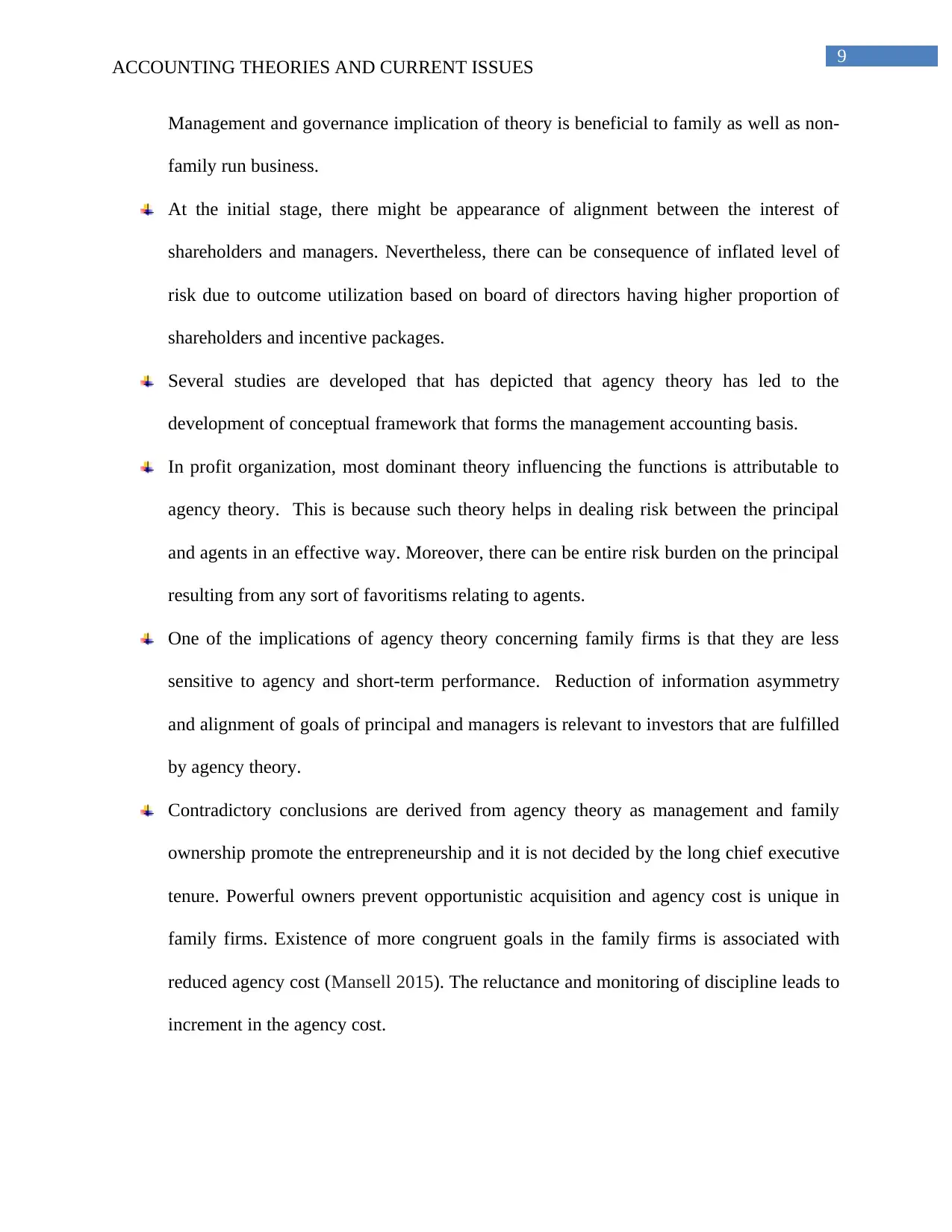
9
ACCOUNTING THEORIES AND CURRENT ISSUES
Management and governance implication of theory is beneficial to family as well as non-
family run business.
At the initial stage, there might be appearance of alignment between the interest of
shareholders and managers. Nevertheless, there can be consequence of inflated level of
risk due to outcome utilization based on board of directors having higher proportion of
shareholders and incentive packages.
Several studies are developed that has depicted that agency theory has led to the
development of conceptual framework that forms the management accounting basis.
In profit organization, most dominant theory influencing the functions is attributable to
agency theory. This is because such theory helps in dealing risk between the principal
and agents in an effective way. Moreover, there can be entire risk burden on the principal
resulting from any sort of favoritisms relating to agents.
One of the implications of agency theory concerning family firms is that they are less
sensitive to agency and short-term performance. Reduction of information asymmetry
and alignment of goals of principal and managers is relevant to investors that are fulfilled
by agency theory.
Contradictory conclusions are derived from agency theory as management and family
ownership promote the entrepreneurship and it is not decided by the long chief executive
tenure. Powerful owners prevent opportunistic acquisition and agency cost is unique in
family firms. Existence of more congruent goals in the family firms is associated with
reduced agency cost (Mansell 2015). The reluctance and monitoring of discipline leads to
increment in the agency cost.
ACCOUNTING THEORIES AND CURRENT ISSUES
Management and governance implication of theory is beneficial to family as well as non-
family run business.
At the initial stage, there might be appearance of alignment between the interest of
shareholders and managers. Nevertheless, there can be consequence of inflated level of
risk due to outcome utilization based on board of directors having higher proportion of
shareholders and incentive packages.
Several studies are developed that has depicted that agency theory has led to the
development of conceptual framework that forms the management accounting basis.
In profit organization, most dominant theory influencing the functions is attributable to
agency theory. This is because such theory helps in dealing risk between the principal
and agents in an effective way. Moreover, there can be entire risk burden on the principal
resulting from any sort of favoritisms relating to agents.
One of the implications of agency theory concerning family firms is that they are less
sensitive to agency and short-term performance. Reduction of information asymmetry
and alignment of goals of principal and managers is relevant to investors that are fulfilled
by agency theory.
Contradictory conclusions are derived from agency theory as management and family
ownership promote the entrepreneurship and it is not decided by the long chief executive
tenure. Powerful owners prevent opportunistic acquisition and agency cost is unique in
family firms. Existence of more congruent goals in the family firms is associated with
reduced agency cost (Mansell 2015). The reluctance and monitoring of discipline leads to
increment in the agency cost.
Paraphrase This Document
Need a fresh take? Get an instant paraphrase of this document with our AI Paraphraser
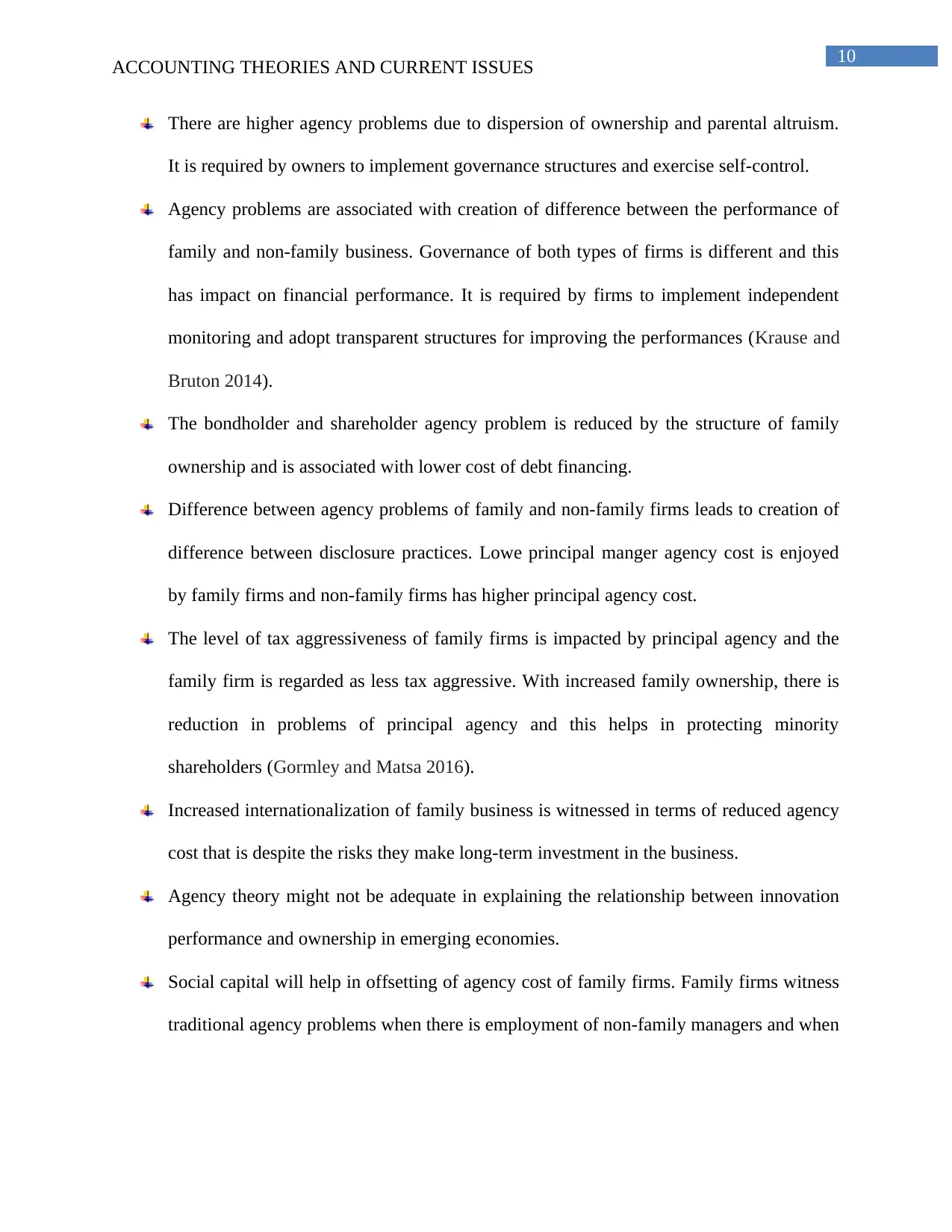
10
ACCOUNTING THEORIES AND CURRENT ISSUES
There are higher agency problems due to dispersion of ownership and parental altruism.
It is required by owners to implement governance structures and exercise self-control.
Agency problems are associated with creation of difference between the performance of
family and non-family business. Governance of both types of firms is different and this
has impact on financial performance. It is required by firms to implement independent
monitoring and adopt transparent structures for improving the performances (Krause and
Bruton 2014).
The bondholder and shareholder agency problem is reduced by the structure of family
ownership and is associated with lower cost of debt financing.
Difference between agency problems of family and non-family firms leads to creation of
difference between disclosure practices. Lowe principal manger agency cost is enjoyed
by family firms and non-family firms has higher principal agency cost.
The level of tax aggressiveness of family firms is impacted by principal agency and the
family firm is regarded as less tax aggressive. With increased family ownership, there is
reduction in problems of principal agency and this helps in protecting minority
shareholders (Gormley and Matsa 2016).
Increased internationalization of family business is witnessed in terms of reduced agency
cost that is despite the risks they make long-term investment in the business.
Agency theory might not be adequate in explaining the relationship between innovation
performance and ownership in emerging economies.
Social capital will help in offsetting of agency cost of family firms. Family firms witness
traditional agency problems when there is employment of non-family managers and when
ACCOUNTING THEORIES AND CURRENT ISSUES
There are higher agency problems due to dispersion of ownership and parental altruism.
It is required by owners to implement governance structures and exercise self-control.
Agency problems are associated with creation of difference between the performance of
family and non-family business. Governance of both types of firms is different and this
has impact on financial performance. It is required by firms to implement independent
monitoring and adopt transparent structures for improving the performances (Krause and
Bruton 2014).
The bondholder and shareholder agency problem is reduced by the structure of family
ownership and is associated with lower cost of debt financing.
Difference between agency problems of family and non-family firms leads to creation of
difference between disclosure practices. Lowe principal manger agency cost is enjoyed
by family firms and non-family firms has higher principal agency cost.
The level of tax aggressiveness of family firms is impacted by principal agency and the
family firm is regarded as less tax aggressive. With increased family ownership, there is
reduction in problems of principal agency and this helps in protecting minority
shareholders (Gormley and Matsa 2016).
Increased internationalization of family business is witnessed in terms of reduced agency
cost that is despite the risks they make long-term investment in the business.
Agency theory might not be adequate in explaining the relationship between innovation
performance and ownership in emerging economies.
Social capital will help in offsetting of agency cost of family firms. Family firms witness
traditional agency problems when there is employment of non-family managers and when
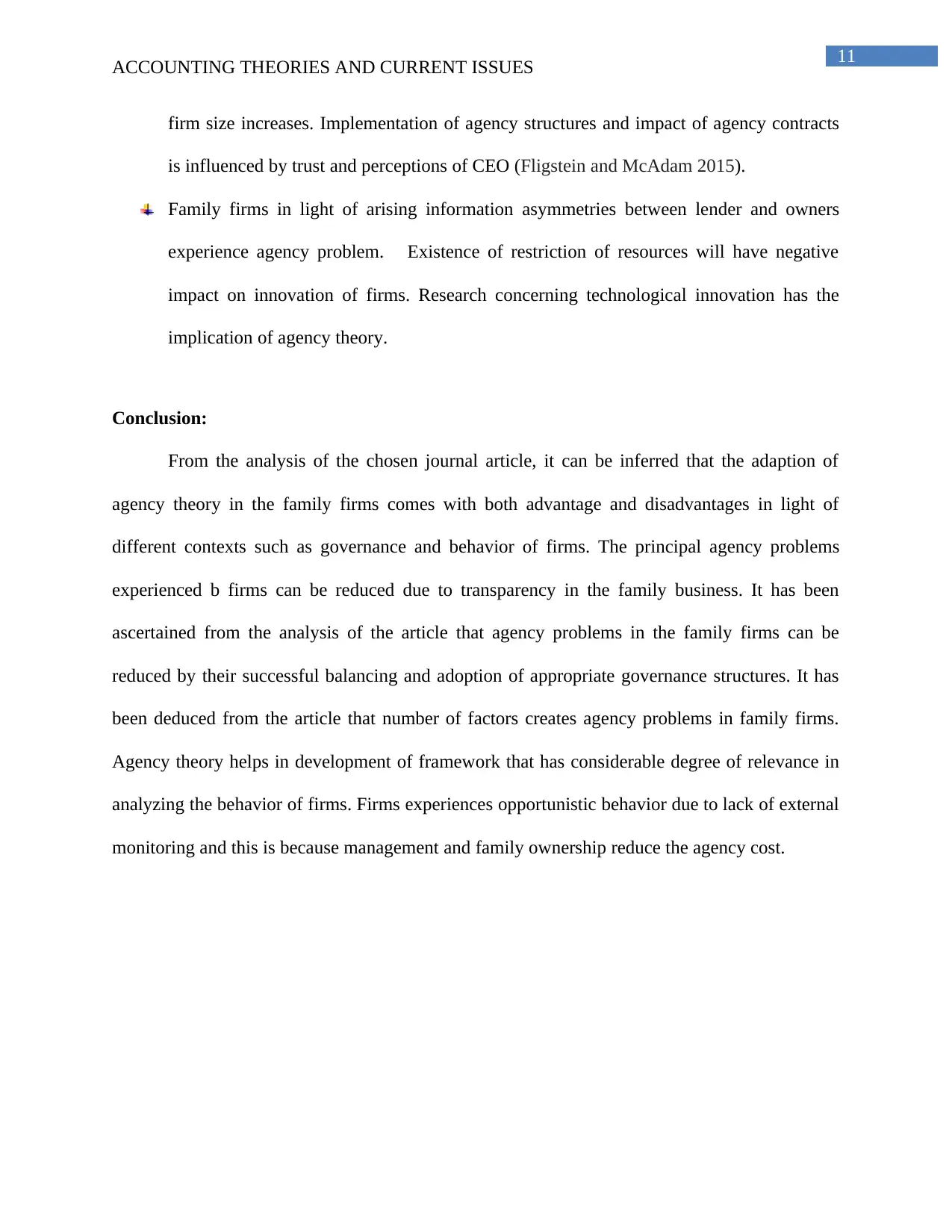
11
ACCOUNTING THEORIES AND CURRENT ISSUES
firm size increases. Implementation of agency structures and impact of agency contracts
is influenced by trust and perceptions of CEO (Fligstein and McAdam 2015).
Family firms in light of arising information asymmetries between lender and owners
experience agency problem. Existence of restriction of resources will have negative
impact on innovation of firms. Research concerning technological innovation has the
implication of agency theory.
Conclusion:
From the analysis of the chosen journal article, it can be inferred that the adaption of
agency theory in the family firms comes with both advantage and disadvantages in light of
different contexts such as governance and behavior of firms. The principal agency problems
experienced b firms can be reduced due to transparency in the family business. It has been
ascertained from the analysis of the article that agency problems in the family firms can be
reduced by their successful balancing and adoption of appropriate governance structures. It has
been deduced from the article that number of factors creates agency problems in family firms.
Agency theory helps in development of framework that has considerable degree of relevance in
analyzing the behavior of firms. Firms experiences opportunistic behavior due to lack of external
monitoring and this is because management and family ownership reduce the agency cost.
ACCOUNTING THEORIES AND CURRENT ISSUES
firm size increases. Implementation of agency structures and impact of agency contracts
is influenced by trust and perceptions of CEO (Fligstein and McAdam 2015).
Family firms in light of arising information asymmetries between lender and owners
experience agency problem. Existence of restriction of resources will have negative
impact on innovation of firms. Research concerning technological innovation has the
implication of agency theory.
Conclusion:
From the analysis of the chosen journal article, it can be inferred that the adaption of
agency theory in the family firms comes with both advantage and disadvantages in light of
different contexts such as governance and behavior of firms. The principal agency problems
experienced b firms can be reduced due to transparency in the family business. It has been
ascertained from the analysis of the article that agency problems in the family firms can be
reduced by their successful balancing and adoption of appropriate governance structures. It has
been deduced from the article that number of factors creates agency problems in family firms.
Agency theory helps in development of framework that has considerable degree of relevance in
analyzing the behavior of firms. Firms experiences opportunistic behavior due to lack of external
monitoring and this is because management and family ownership reduce the agency cost.
⊘ This is a preview!⊘
Do you want full access?
Subscribe today to unlock all pages.

Trusted by 1+ million students worldwide
1 out of 15
Related Documents
Your All-in-One AI-Powered Toolkit for Academic Success.
+13062052269
info@desklib.com
Available 24*7 on WhatsApp / Email
![[object Object]](/_next/static/media/star-bottom.7253800d.svg)
Unlock your academic potential
Copyright © 2020–2026 A2Z Services. All Rights Reserved. Developed and managed by ZUCOL.





